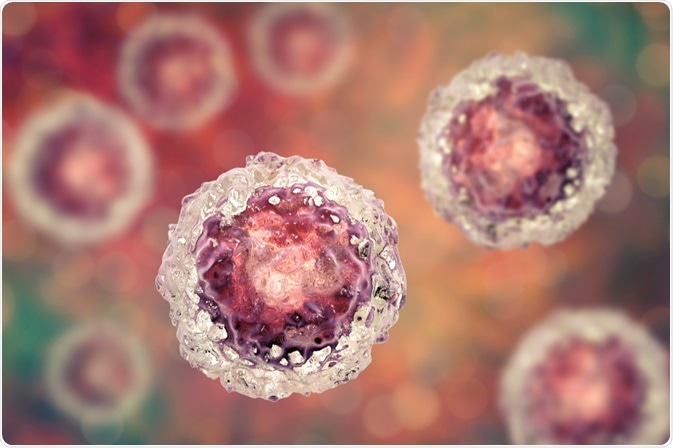What are cancer stem cells?
An early cancer diagnosis is associated with a higher chance of survival and even curability as compared to cancers that are diagnosed at a later stage. While this may be true, any cancer that has been detected and treated at an early stage can still leave residual cells that have the potential to ultimately allow for tumor recurrence.
 Image Credits: Kateryna Kon / Shutterstock.com
Image Credits: Kateryna Kon / Shutterstock.com
Growing evidence has found that these residual cells may possess stem-like properties and functions, which has led researchers to denote these cells as cancer stem cells.
The cancer stem cell theory of cancer progression states that a tumor is a hierarchically organized tissue in which cancer stem cells exist at the top rank of this hierarchy. With similar self-renewal and differentiation properties to that which is found in normal stem cells, cancer stem cells are capable of differentiating the majority of tumor cells to have lower proliferative abilities.
Some of the most notable surface markers found on cancer stem cells include CD133, CD44, CD90 and side population cells; however, other biomarkers may be indicative of specific types of cancer stem cells, such as CXCR4 found on colorectal cancer stem cells.
Targeted toxin-based nanoparticles against CXCR4+ cancer stem cells
As compared to conventional chemotherapy drugs, nanoparticles offer a greater level of efficiency in the delivery of the payload drug to target cells. Furthermore, nanoparticles are associated with limited biodistribution to normal tissues, thereby reducing the occurrence of unwanted side effects that are typically associated with traditional chemotherapeutic drugs.
In addition to encapsulating and/or linking common chemotherapeutic agents with nanoparticles, many researchers have been able to manipulate the delivery of otherwise toxic agents through this technology.
To this end, a recent study published in the Journal of Controlled Release, a group of researchers created a novel toxin-based nanoparticle drug that was specifically designed to attack colorectal cancer stem cells with overexpression of the chemokine receptor CXCR4.
In their work, the catalytic domain of two toxins including diptheria toxin (DITOX) and the Pseudomonas aeruginosa exotoxin (PE24) were engineered as self-assembling nanoparticles. The decision to use both DITOX and PE24 was due to the extreme lethality of these substances to ribosome inactivating proteins (RIPs), which inhibit the eukaryotic elongation factor 2 (eEF-2) that prevents protein synthesis from occurring in cells, ultimately leading to their inevitable destruction.
In vitro evaluation
To test the efficacy for their nanoparticle treatment, the researchers conducted both in vitro and in vivo studies. The in vitro work involved the treatment of four different three-dimensional (3D) colon cancer stem cell spheroid cell lines that were obtained from patients with colorectal cancer.
Once CXCR4 expression was confirmed in all four cell lines through reverse transcriptase polymerase chain reaction (RT-PCR), the cell line Da13, which was found to have the highest association of CXCR4 and its stem cell function, was chosen for nanoparticle uptake and cytotoxicity studies.
The internalization of the nanoparticles was achieved by treating the Da13 cell line with fluorescently labeled toxin-based nanoparticles. Following treatment, confocal laser microscopy was used to assess the intracellular fluorescence of the nanoparticles within the cells and confirm the role of CXCR4 in mediating the uptake of the nanoparticles.
Cytotoxicity of the nanoparticles was also observed to be specific to CXCR4+ cell lines, thereby eliminating the potential cytotoxicity of these agents to normal colon cells that do not express this receptor.
Notably, both DITOX and PE24 nanoparticle formulations were found to be more cytotoxic as compared to a traditional chemotherapeutic agent. However, at the end of the in vitro studies, DITOX nanoparticles, which are otherwise referred to as T22-DITOX-H6, were found to have a higher cytotoxicity to CXCR4+ cells, which led the researchers to select this specific formulation for subsequent in vivo experiments.
In vivo evaluation
Once the DITOX nanoparticle formulation was selected for its high efficiency, specificity and selective cytotoxicity, a cancer stem cell spheroid-derived mouse model was used to assess its tolerability and antitumor activity in vivo.
The creation of this mouse model was achieved by the implantation of cultured Da13 CXCR4+ cells into the mice. Once tumors reached a measurable size, T22-DITOX-H6, as well as a positive control of a common chemotherapeutic agent, were administered every two days.
The researchers found that T22-DITOX-H6 achieved a greater level of tumor shrinkage as compared to the positive control by the end of the study. Additionally, toxicity studies on the kidney and liver of all mice confirmed the specificity of T22-DITOXI-H6 to only tumor cells that were positive for CXCR4.
Conclusion
Despite the lack of work done on the treatment of cancer stem cells, it is clear from several research studies that the underlying presence of these cell populations can determine the recurrence of cancer, even after aggressive treatment has been completed.
The work here demonstrates the specificity of a toxin-based protein-only nanoparticle formulation that specifically targets CXCR4+ colorectal cancer stem cell. With at least 23 other types of human cancers that are associated with CXCR4 overexpression, this nanoparticle formulation has the potential to change the way in which cancer cells are targeted for relapse prevention in the future.
Sources
Ayob, A. Z., & Ramasamy, T. S. (2018). Cancer stem cells as key drivers of tumor progression. Journal of Biomedical Science 25(20). DOI: 10.1186/s12929-018-0426-4.
Serna, N., Alamo, P., Ramesh, P., Vinokurova, D., Sanchez-Garcia, L., et al. (2020). Nanostructured toxins for the selective destruction of drug-resistant human CXCR4+ colorectal cancer stem cells. Journal of Controlled Release 320; 96-104. DOI: 10.1016/j.jconrel.2020.01.019.
Further Reading
- All Cancer Content
- What is Cancer?
- What Causes Cancer?
- Cancer Glossary
- Cancer Classification
Last Updated: Jun 17, 2020

Written by
Benedette Cuffari
After completing her Bachelor of Science in Toxicology with two minors in Spanish and Chemistry in 2016, Benedette continued her studies to complete her Master of Science in Toxicology in May of 2018.During graduate school, Benedette investigated the dermatotoxicity of mechlorethamine and bendamustine, which are two nitrogen mustard alkylating agents that are currently used in anticancer therapy.
Source: Read Full Article